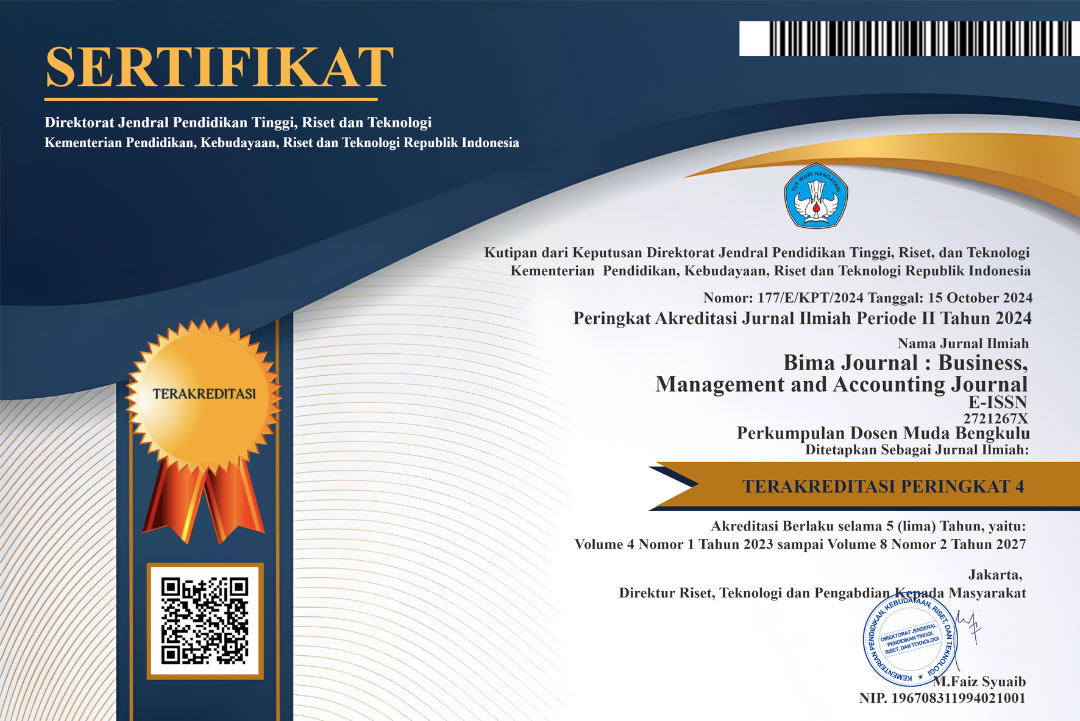Analyzing Online Lending In The Islamic Economy: Ethical Challenges And Fintech Innovations In Indonesia
DOI:
https://doi.org/10.37638/bima.5.2.133-140Keywords:
Shari'ah Economics, Fintech, Online LoanAbstract
Purpose: This study aims to analyze the opportunities and challenges in implementing Sharia-compliant online lending models within Indonesia's Islamic fintech ecosystem, with strategic recommendations for sustainable development.
Methodology: A qualitative approach was used, combining literature analysis, interviews with industry players, and evaluation of regulations. The focus was on assessing Sharia compliance and exploring best practices from global Islamic fintech ecosystems. Results: The findings reveal significant potential for Islamic fintech in promoting financial inclusion, particularly for underserved communities. However, challenges such as low Islamic financial literacy and inconsistent regulatory oversight hinder progress. Findings: Sharia-compliant contracts like qard hasan, musyarakah, and mudarabah show promise in addressing ethical concerns and fostering financial sustainability. Originality: This research provides a comprehensive evaluation of Sharia-compliant online lending models in Indonesia, incorporating global best practices. Novelty: The study highlights the strategic role of maqashid sharia principles in creating ethical and transparent fintech solutions. Conclusions: Strengthened regulations, public education, and innovation in contract models are essential for sustainable Islamic fintech development in Indonesia. Type of Paper: Conceptual research.
References
Amelia, A., Arwanda, D., Rama, R., & Aeni, A. N. (2023). Panduan Dan Aturan Pinjaman Online Bagi Masyarakat Dalam Persepektif Islam. Jurnal Locus Penelitian Dan Pengabdian, 2(10), 1033-1042. https://doi.org/10.58344/locus.v2i10.12
Andeska, M. Niko, Helda Nusrida, and Gusnam Haris. (2024). Analisis Hukum Ekonomi Syariah Terhadap Bisnis Startup Crowdfunding Syariah. Iqtishaduna: Jurnal Ilmiah Mahasiswa Hukum Ekonomi Syari'ah: 380-404. https://doi.org/10.24252/iqtishaduna.vi.46812
Braun, V., & Clarke, V. (2013). Successful qualitative research: A practical guide for beginners. Sage.
Creswell, J. W. (2013). Research design: Qualitative, quantitative, and mixed methods approaches (4th ed.). Sage.
Ismail, A. H. (2011). Principles of Islamic Banking and Finance. Kuala Lumpur: International Shari’ah Research Academy.
Kahf, M. (2004). Theoretical Studies in Islamic Banking and Finance. Jeddah: King Abdulaziz University Press.
Khairani, Z. and Taufiq, M. (2023). Pelaksanaan Transaksi Pinjaman Online Di Lubuk Sikaping, Kabupaten Pasaman Ditinjau Dari Prepektif Ekonomi Islam. Jurnal Ilmiah Manajemen, Bisnis Dan Kewirausahaan, 3(1), 125-133. https://doi.org/10.55606/jurimbik.v3i1.440
KILIÇ, Gökmen, et al. (2023). The Emergence Of Islamic Fintech And Its Applications. International Journal of Islamic Economics and Finance Studies, 2023.
Moleong, L. J. (2019). Metodologi penelitian kualitatif (Rev. ed.). Bandung: Remaja Rosdakarya.
Muneer, Farah, et al. (2019). Qard-Al-Hassan As A Tool For Poverty Alleviation A Case Of Fael Khair Waqf Program In Bangladesh. Journal of Islamic Monetary Economics and Finance, vol. 5, no. 4, 2019, p. 829-848. https://doi.org/10.21098/jimf.v5i4.1100
Paden, Oktavianus, et al. (2024). Analasis Dampak Resiko Pinjaman Online Terhadap Mahasiswa. Jurnal Ilmiah Sistem Informasi 4.: 98-113. https://doi.org/10.46306/sm.v4i1.82
Prasetyo, B., & Sutopo, W. (2018). Inklusi Keuangan Digital di Indonesia. Jurnal Ekonomi dan Bisnis Islam, 15(2), 45-59. https://doi.org/10.1234/jebi.15.2.45.
Rahmatullah, A., & Fauziah, R. (2019). Regulasi Fintech Syariah di Indonesia. Jurnal Hukum Ekonomi Syariah, 14(3), 120-135. https://doi.org/10.1234/jhes.14.3.120.
Siddiqi, M. N. (2006). The Moral Economy in Islamic Perspective. New Delhi: Markazi Maktaba Islami.
Sugiyono. (2019). Metode penelitian kuantitatif, kualitatif, dan R&D. Bandung: Alfabeta.
Susanto, E. (2021). Problematika Pinjaman Online di Indonesia. Jurnal Hukum Islam, 20(1), 100-112. https://doi.org/10.1234/jhis.20.1.100.
Usmani, M. T. (1998). An Introduction to Islamic Finance. Karachi: Idaratul Ma’arif.
Wafa, Ah Khairul. (2020). Tinjauan Hukum Ekonomi Syariah terhadap Shopeepay Later. Jurnal Hukum Ekonomi Syariah 4.01: 16-30. https://doi.org/10.26618/J-HES.V4I01.3588
Wulandari, R., & Purwanti, E. (2020). Literasi Keuangan Syariah di Indonesia. Jurnal Keuangan Islam, 12(3), 220-230. https://doi.org/10.1234/jki.12.3.220.
Yusuf, M. (2020). Implementasi Maqashid Syariah dalam Fintech. Jurnal Syariah dan Ekonomi Islam, 18(2), 50-70. https://doi.org/10.1234/jsei.18.2.50.
Downloads
Additional Files
Published
Issue
Section
License
An author who publishes in the BIMA JOURNAL: Business, Management, and Accounting Journal agrees to the following terms:
Author retains the copyright and grants the journal the right of first publication of the work simultaneously licensed under the Creative Commons Attribution-ShareAlike 4.0 License that allows others to share the work with an acknowledgement of the work's authorship and initial publication in this journal
Submission of a manuscript implies that the submitted work has not been published before (except as part of a thesis or report, or abstract); that it is not under consideration for publication elsewhere; that its publication has been approved by all co-authors. If and when the manuscript is accepted for publication, the author(s) still hold the copyright and retain publishing rights without restrictions. For the new invention, authors are suggested to manage its patent before published. The license type is CC-BY-SA 4.0.
BIMA JOURNAL: Business, Management and Accounting is licensed under a Creative Commons Attribution-ShareAlike 4.0 International License.
You are free to:
Share — copy and redistribute the material in any medium or format
Adapt — remix, transform, and build upon the material
for any purpose, even commercially.
The licensor cannot revoke these freedoms as long as you follow the license terms.
Under the following terms:
Attribution — You must give appropriate credit, provide a link to the license, and indicate if changes were made. You may do so in any reasonable manner, but not in any way that suggests the licensor endorses you or your use.
ShareAlike — If you remix, transform, or build upon the material, you must distribute your contributions under the same license as the original.
- No additional restrictions — You may not apply legal terms or technological measures that legally restrict others from doing anything the license permits.
Notices:
- You do not have to comply with the license for elements of the material in the public domain or where your use is permitted by an applicable exception or limitation.
- No warranties are given. The license may not give you all of the permissions necessary for your intended use. For example, other rights such as publicity, privacy, or moral rights may limit how you use the material.





















